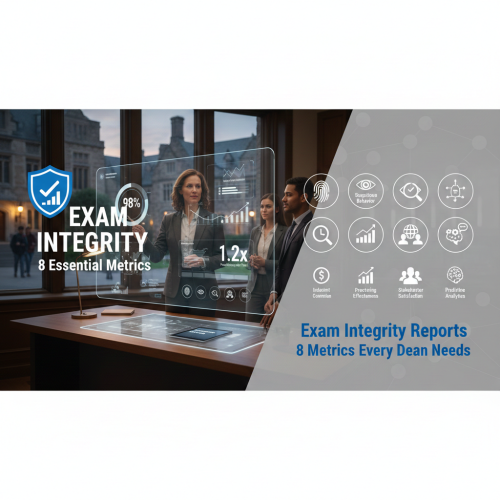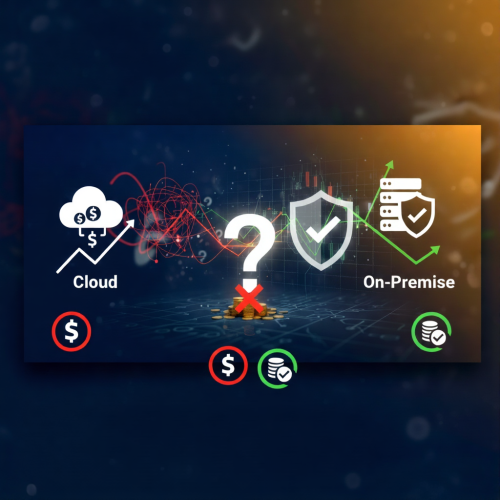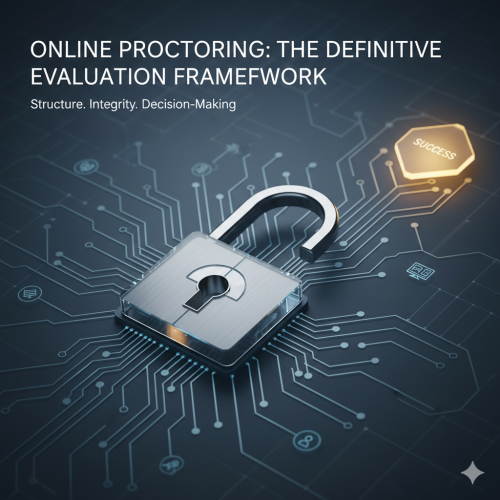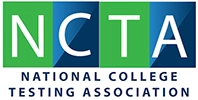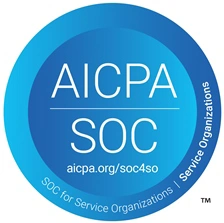The shift to online and hybrid learning has created an urgent need for secure remote assessment solutions. As educational institutions across India evaluate AI proctoring platforms, they're discovering that choosing the right solution is about much more than just preventing cheating.
The decision impacts student experience, faculty workload, institutional costs, and long-term scalability. Get it right, and you enable quality education at scale. Get it wrong, and you face student backlash, technical failures, and wasted investments.
This article explores how forward-thinking institutions approach the AI proctoring selection process — and what you can learn from their experience.
At DIDAC India 2025 (November 18-20, Booth F31, Yashobhoomi Convention Centre, New Delhi), you'll have the opportunity to compare multiple proctoring solutions and understand what sets different platforms apart.
Why the Selection Process Matters
The stakes are high:
❌ Poor Choice Consequences:
- Student complaints about unfair monitoring or technical issues
- Faculty frustration with complicated workflows
- Wasted budget on solutions that don't scale
- Exam security breaches that damage institutional reputation
- Compliance failures with regulatory requirements
✅ Good Choice Benefits:
- Seamless student experience that maintains academic integrity
- Faculty efficiency gains and better assessment insights
- Cost savings that fund other educational initiatives
- Scalable infrastructure for growing online programs
- Competitive advantage in attracting students
The Seven Key Evaluation Criteria
Based on how leading institutions evaluate proctoring solutions, here are the critical factors to consider:
1. 🔐 Security and Integrity
What Institutions Look For:
Multi-Layer Detection:
- Identity verification (facial recognition, ID validation)
- Real-time monitoring (webcam, screen, audio)
- Behavioral analysis (keystroke patterns, mouse movements)
- Environmental scanning (detecting unauthorized materials)
Fraud Prevention Capabilities:
- Ability to detect sophisticated cheating methods
- Balance between security and false positive rates
- Clear evidence trails for review
- Transparent flagging criteria
Key Questions to Ask:
- What types of fraud can the system detect?
- How does it handle false positives?
- Can faculty review flagged incidents with video evidence?
- Is the flagging criteria transparent to students?
Why This Matters:
The core purpose of proctoring is maintaining academic integrity. A solution that either misses violations or falsely accuses innocent students fails in its primary mission.
2. 🎓 Student Experience
What Institutions Look For:
Accessibility:
- Works on various devices (Windows, Mac)
- Functions with different bandwidth levels
- Accommodates students with disabilities
- Supports students in remote or underserved areas
User-Friendliness:
- Simple setup process
- Clear instructions
- Practice mode available
- Responsive technical support during exams
Privacy Considerations:
- Transparent about what data is collected
- Minimal invasiveness while maintaining security
- Clear data retention and deletion policies
- Student consent processes
Key Questions to Ask:
- What devices and operating systems are supported?
- What minimum internet bandwidth is required?
- How do you accommodate students with disabilities?
- What support is available during exams?
Why This Matters:
Student satisfaction directly impacts adoption success. A system that alienates students will face resistance, complaints, and potentially legal challenges.
3. 👨🏫 Faculty and Administrative Efficiency
What Institutions Look For:
Ease of Use:
- Intuitive interface for setting up exams
- Quick learning curve for faculty
- Minimal training required
- Efficient review workflows
Time Savings:
- Automated monitoring vs. manual proctoring
- Quick incident review (flagged clips vs. full recordings)
- Integration with grading workflows
- Reduced administrative coordination
Analytics and Insights:
- Exam integrity reports
- Student performance analytics
- Question difficulty analysis
- Trend identification across cohorts
Key Questions to Ask:
- How much time does faculty spend reviewing a typical exam?
- What training is required for faculty and staff?
- What analytics are provided beyond security monitoring?
- Can the system integrate with existing grading processes?
Why This Matters:
Faculty buy-in is essential. If the system creates more work than it saves, adoption will fail regardless of how secure it is.
4. 🔗 Technical Integration
What Institutions Look For:
LMS Compatibility:
- Seamless integration with existing learning management systems
- Single sign-on capabilities
- Automatic grade synchronization
- Consistent user experience
Infrastructure Requirements:
- Server requirements and hosting options
- IT team bandwidth needed for implementation
- Ongoing maintenance responsibilities
- Security and compliance alignment
Scalability:
- Ability to handle peak exam loads
- Performance with growing student numbers
- Geographic distribution capabilities
- System reliability and uptime
Key Questions to Ask:
- Which LMS platforms do you integrate with?
- What is the implementation timeline?
- What ongoing IT support is required?
- How does the system handle peak concurrent users?
Why This Matters:
Technical integration determines how smoothly the solution fits into existing workflows. Poor integration creates friction for everyone involved.
5. 💰 Total Cost of Ownership
What Institutions Look For:
Pricing Structure:
- Per-exam vs. per-student vs. flat-fee models
- Volume discounts for larger institutions
- Predictable pricing as you scale
- Contract flexibility (monthly, annual, multi-year)
Hidden Costs:
- Setup and implementation fees
- Training and onboarding costs
- Ongoing support charges
- Integration and customization fees
- Bandwidth and infrastructure costs
ROI Calculation:
- Savings vs. traditional proctoring methods
- Efficiency gains for faculty and staff
- Scalability without proportional cost increase
- Long-term value vs. initial investment
Key Questions to Ask:
- What is included in the base pricing?
- Are there additional fees we should anticipate?
- How does pricing change as we scale?
- What is the typical ROI timeline?
Why This Matters:
Budget constraints are real. Understanding total cost of ownership helps make informed decisions and avoid surprises.
6. 📋 Compliance and Data Privacy
What Institutions Look For:
Regulatory Compliance:
- Alignment with UGC/AICTE online examination guidelines
- Support for NAAC accreditation requirements
- Data localization compliance (if applicable)
- International standards (GDPR, etc.) for global students
Data Security:
- Encryption standards (in transit and at rest)
- Data storage locations
- Access controls and audit trails
- Security certifications (ISO 27001, SOC 2, etc.)
Privacy Practices:
- Clear data retention policies
- Student data ownership
- Data deletion processes
- Consent management
Key Questions to Ask:
- Where is student data stored?
- What security certifications do you have?
- How long is data retained?
- How do you handle data deletion requests?
Why This Matters:
Legal and regulatory compliance is non-negotiable. A solution that puts you at legal risk isn't worth any cost savings.
7. 🤝 Vendor Partnership and Support
What Institutions Look For:
Vendor Stability:
- Company track record and history
- Customer base and references
- Financial stability
- Product roadmap and innovation
Support Quality:
- Availability (24/7 vs. business hours)
- Response time commitments
- Channels (phone, email, chat)
- Quality of technical assistance
Partnership Approach:
- Dedicated account management
- Customization willingness
- Feature request consideration
- Long-term relationship focus
Key Questions to Ask:
- How long has your company been operating?
- Can you provide references from similar institutions?
- What support is available during exam periods?
- How do you incorporate customer feedback?
Why This Matters:
You're not just buying software — you're entering a partnership. The vendor's commitment to your success matters as much as their technology.
Common Implementation Challenges and How to Overcome Them
Even with the right solution, implementation can be challenging. Here's what institutions typically face:
Challenge 1: Student Resistance
Common Concerns:
- Privacy invasion fears
- Technical anxiety
- Perceived unfairness
Solutions:
- Transparent communication about how the system works
- Practice exams to build confidence
- Clear privacy policies and data handling
- Responsive support during exams
Challenge 2: Faculty Adoption
Common Concerns:
- Learning new technology
- Increased workload perception
- Trust in automated systems
Solutions:
- Comprehensive training programs
- Demonstrate time savings with data
- Involve faculty in pilot testing
- Provide ongoing support
Challenge 3: Technical Infrastructure
Common Concerns:
- Bandwidth limitations
- Device availability
- IT support capacity
Solutions:
- Choose solutions with low bandwidth requirements
- Provide guidance on device requirements
- Start with pilot programs
- Plan for peak load scenarios
Challenge 4: Cost Justification
Common Concerns:
- Upfront investment
- ROI uncertainty
- Budget constraints
Solutions:
- Calculate total cost of current proctoring methods
- Project savings at scale
- Start with pilot to demonstrate value
- Consider phased implementation
The Decision-Making Process: A Recommended Approach
Phase 1: Requirements Definition (2-4 weeks)
- Assess your specific needs (exam types, student numbers, technical constraints)
- Identify stakeholder priorities (students, faculty, IT, finance)
- Define must-have vs. nice-to-have features
- Establish budget parameters
Phase 2: Vendor Research and Shortlisting (2-3 weeks)
- Research available solutions
- Request demonstrations from 3-5 vendors
- Compare features against requirements
- Check references and reviews
Phase 3: Deep Evaluation (3-4 weeks)
- Request detailed proposals
- Conduct technical evaluations
- Review contracts and pricing
- Speak with current customers
Phase 4: Pilot Testing (1 semester)
- Implement with limited student cohort
- Gather feedback from all stakeholders
- Measure against success criteria
- Identify needed adjustments
Phase 5: Full Implementation or Pivot
- Decide based on pilot results
- Plan phased rollout if proceeding
- Negotiate final contract terms
- Develop change management plan
Questions to Ask During Vendor Demonstrations
When evaluating solutions at events like DIDAC India 2025, ask:
About the Technology:
- Can I see a live demo where someone tries to cheat?
- How do you handle poor internet connections?
- What happens if a student's device crashes mid-exam?
About Implementation: 4. What is the typical implementation timeline? 5. What training do you provide? 6. What ongoing support is included?
About Costs: 7. What is your pricing model? 8. Are there any hidden fees? 9. How does pricing scale with student growth?
About Track Record: 10. Which institutions currently use your solution? 11. Can I speak with your current customers? 12. What challenges have other institutions faced?
See Multiple Solutions at DIDAC India 2025
The best way to evaluate proctoring solutions is to see them in action.
Visit Proctor360 at DIDAC India 2025:
- 📅 Dates: November 18-20, 2025
- 📍 Location: Booth F31, Hall 2, Yashobhoomi Convention Centre, New Delhi
- ⏰ Timing: 10:00 AM - 6:00 PM daily
What You'll Experience:
🎯 Live Demonstrations: Experience AI proctoring from both student and administrator perspectives
📊 Feature Comparison: Understand what differentiates various solutions
💬 Expert Consultations: Discuss your specific requirements with proctoring specialists
📋 Evaluation Tools: Get decision-making frameworks and comparison checklists
🎁 Exclusive Offers: Booth-only pricing and pilot program opportunities
Why Visit Multiple Booths:
Don't just visit us — compare multiple vendors! The more solutions you see, the better informed your decision will be.
At Booth F31, we'll give you honest guidance even if our solution isn't the right fit for your needs.
Conclusion: Make an Informed Decision
Choosing an AI proctoring solution is a significant decision that will impact your institution for years to come.
Key Takeaways:
✅ Evaluate holistically: Consider security, student experience, faculty efficiency, integration, cost, compliance, and vendor support
✅ Test before committing: Always run a pilot program before full implementation
✅ Involve stakeholders: Get input from students, faculty, IT, and administration
✅ Think long-term: Choose a solution that can scale with your institution's growth
✅ Compare options: See multiple vendors in action before deciding
The right AI proctoring solution will enable your institution to deliver quality education at scale while maintaining academic integrity.
Visit us at DIDAC India 2025, Booth F31, to explore your options. 🚀
About Proctor360
Proctor360 is an AI-powered remote proctoring solution designed to help educational institutions conduct secure online assessments. We're committed to supporting India's educational institutions in their digital transformation journey.
Learn more:
Tags: #AIProctoring #EdTech #OnlineExams #HigherEducation #DIDACIndia2025 #ProctoringSelection #EducationTechnology

